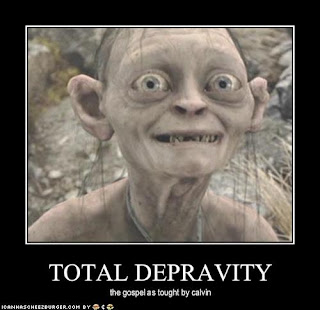 Ah, yes, nothing more fun to teach than that sweet-smelling doctrine, total depravity. While it is unpopular, it is very important for students to understand for many reasons. Cameron Cole tells us why.
Ah, yes, nothing more fun to teach than that sweet-smelling doctrine, total depravity. While it is unpopular, it is very important for students to understand for many reasons. Cameron Cole tells us why.1.) Why is it difficult or unpopular to teach?
I think it is difficult for two reasons. First, who really likes to be told that they are totally depraved? That just doesn’t have a pleasant ring to it! In this light, it is a part of our sinful nature to resist the dark reality of our humanity. In this day of secular humanism, where every form of media proclaims the inherit power and benevolence of mankind, the message of original sin and depravity starkly contradicts what students hear.
Secondly, because most teenagers do not have a deep theological understanding of sin, the idea that they are completely depraved defies their experience. A common reaction to this doctrine is a student misunderstanding that total depravity means that all they do is murder, rob, and steal, which conflicts with “nice things” they do in their life. Surely, a person giving to the poor or helping their mother with dishes is not evil, right? They initially think about total depravity in terms of external actions, not internal motives. In other words, they see the Wicked Witch of the West when they hear this term.
2.) How do you define and describe this concept to students?
First off, I do not think it is critically important that my kids know and can use the term “total depravity” at this point. I am more concerned that they understand conceptually that all human action possesses an underlying sinful motive.
I describe total depravity to adolescents by telling them that deep down inside all of our behavior inherently has some unconscious motivation rooted in operating independently from God or seeking selfish gain. All action has at least some selfish taint. I also explain that this occurs innately, without our awareness, because of our sinful nature. And then I say that the Bible describes living that way as depraved.
3.) Why do you think it is important to teach this?
Acknowledging the truth of the depth of our sin sets kids free. Last year on a mission trip, a student said that understanding total depravity “relieved a burden” because it showed her that trying to be perfect was pointless. The doctrine alleviates the need to keep up the illusion of being something we are not. It also creates an environment for deep worship because knowing our total depravity magnifies the grace and mercy of Christ. It shows just how good God is.
4.) How does this concept help a student better understand the Gospel and grace of Jesus?
Total depravity is a critical building block for a student to understand the freedom of the Gospel. It shows how utterly ill-equipped we are to make ourselves good or righteous and reveals our need for Christ to do all of the work for our salvation. Total depravity takes the wind out of the sail of moralism. Total depravity magnifies just how amazing God’s grace is in that he “saves a wretch like me.”
No comments:
Post a Comment